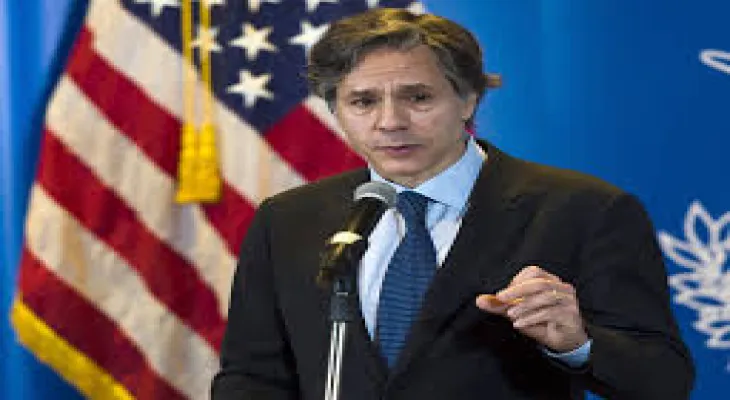Search here
Newspaper
Search here

Arab Canada News
News

Published: June 11, 2024
U.S. Secretary of State Antony Blinken said on Tuesday that the United Nations Security Council's vote in favor of the U.S.-backed proposal for a ceasefire in Gaza and the release of hostages made it "as clear as possible" that the world supports the plan, and he again called on Hamas to accept it.
Blinken told reporters in Tel Aviv after meeting with Israeli officials: "Everyone voted, except for one vote, which was Hamas," adding that Prime Minister Benjamin Netanyahu reaffirmed his commitment to the proposal when they met late Monday.
In a separate development, the United Nations Human Rights Office said that Israeli forces and Palestinian militants may have committed war crimes during the deadly Israeli raid that freed four hostages over the weekend. At least 274 Palestinians were killed in the operation, according to the Gaza Health Ministry.
Blinken's recent visit to the region - his eighth since Hamas's attack on October 7 ignited the war - focused on rallying support for a ceasefire proposal, promoting humanitarian aid access, and strengthening post-war governance plans for Gaza.
He met privately with the families of hostages as well as protesters outside one of the hotels demanding a ceasefire agreement, before traveling on to Jordan. Blinken is also expected to visit Qatar, which has worked alongside Egypt as a key mediator with Hamas. He was in Cairo earlier on Monday.
The proposal, announced by President Joe Biden last month, calls for a three-phase plan in which Hamas would release the remaining hostages in exchange for a permanent ceasefire and the withdrawal of Israeli forces from Gaza. The group still holds approximately 120 hostages, one-third of whom are believed to be dead.
Biden presented it as an Israeli proposal, but Netanyahu publicly objected to key aspects of it, stating that Israel would not end the war without destroying Hamas and recovering all the hostages.
Hamas has not officially responded to the proposal yet. The militant group welcomed the UN resolution and supported the outlines of the agreement but demanded guarantees for its implementation. The militant group had adopted a similar proposal last month that Israel rejected.
Hamas spokesperson Jihad Taha said on Tuesday that efforts are ongoing to study and clarify some issues to ensure its implementation by the Israeli side. He added that Israel "has not provided clear approval or commitment to an implementation that leads to the cessation of aggression."
The UN Security Council voted overwhelmingly on Monday to approve the proposal, with 14 of its fifteen members in favor and Russia abstaining. The resolution calls on Israel and Hamas to "fully implement its terms without delay and unconditionally."
The proposal has raised hopes for ending the eight-month-long war that has resulted in the deaths of over 37,000 Palestinians, according to Gaza health officials, and displaced about 80% of the population of 2.3 million from their homes. Israeli restrictions and ongoing fighting have hindered efforts to deliver humanitarian aid to the isolated coastal strip, leading to widespread hunger.
The war began when Hamas and other militants stormed Israel on October 7, killing around 1,200 people, mostly civilians, and taking about 250 hostages. More than 100 hostages were released during a week-long ceasefire last year in exchange for the release of Palestinians held by Israel.
Biden's announcement on May 31 regarding the new proposal stated that it would begin with an initial ceasefire of six weeks and the release of some hostages in exchange for the release of Palestinian prisoners. Israeli forces would withdraw from populated areas, and Palestinian civilians would be allowed to return to their homes.
The first phase also requires the safe distribution of humanitarian aid "widely throughout the Gaza Strip," which Biden said would lead to the entry of 600 trucks loaded with aid into Gaza daily.
In the second phase, the resolution stipulates that by agreement between Israel and Hamas, there will be "a permanent cessation of hostilities, in exchange for the release of all other remaining hostages who are still in Gaza, and the complete withdrawal of Israeli forces from Gaza."
The third phase will launch "a major multi-year plan for the reconstruction of Gaza and the return of the remains of any deceased hostages who are still in Gaza to their families."
Netanyahu's conflicting signals seem to reflect his political dilemma. His allies in the far-right coalition rejected the proposal and threatened to bring down his government if he ends the war without destroying Hamas. A permanent ceasefire and the withdrawal of Israeli forces from Gaza would likely allow Hamas to maintain control of the area and rebuild its military capabilities.
However, Netanyahu is also under increasing pressure to accept a deal to return the hostages. Thousands of Israelis, including the families of hostages, protested in support of the U.S.-backed plan.
The transition from the first phase to the second appears to represent a sticking point. Hamas wants guarantees that Israel will not resume the war, while Israel wants to ensure that prolonged negotiations over the second phase will not lead to an indefinite extension of the ceasefire while leaving the hostages in captivity.
Blinken stated that the proposal would achieve an immediate ceasefire and require the parties to negotiate a permanent ceasefire. He said, "The ceasefire that will be implemented immediately will remain in place, which is clearly good for everyone. After that, we will need to see."
Comments